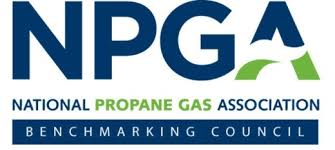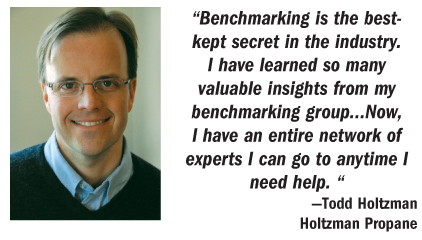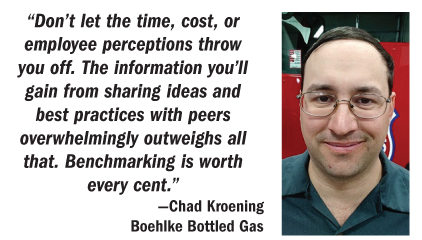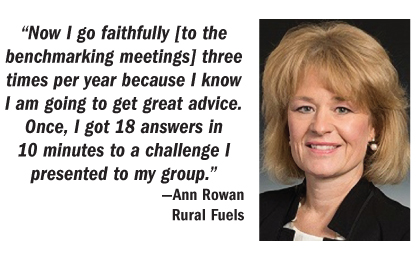Monday, June 4, 2018
Todd Holtzman was on a waiting list for several years before being placed in a group in the National Propane Gas Association’s Benchmarking Council. But when he talks about it, he jokingly says he shouldn’t mention it — because he’s giving away one of the biggest secrets to his success. 
“Benchmarking is the best-kept secret in the industry,” said Holtzman, one of three panelists at the seminar about the Benchmarking Council at the NPGA Southeastern Convention & International Propane Expo in Atlanta. Holtzman’s family had been in the fuel business in Virginia for many years, but as a college senior, his father asked him to return to the business after graduating in 1997 to help start up a propane business. Holtzman said he believes benchmarking gives him a huge advantage over his competition.
“I have learned so many valuable insights from my benchmarking group,” he said. “I’m so glad I waited it out to attend my first meeting. When I started in the propane business, I didn’t know that much and depended on suppliers and other marketers for advice. Now, I have an entire network of experts I can go to anytime I need help. It really plugs you in to what is going on in the industry today.”
Chad Kroening, fleet and projects manager for Boehlke Bottled Gas, a third-generation family-owned business in Wisconsin, told the audience it’s not always easy for him to put aside the daily duties of running a propane company to travel to meetings three times a year. Initially, he said, there were misperceptions about his travel to destination locations such as San Diego or West Palm Beach (during a Wisconsin winter, no less). But, he told the audience of mostly business owners, “Don’t let the time, cost, or employee perceptions throw you off. The information you’ll gain from sharing ideas and best practices with peers overwhelmingly outweighs all that. Benchmarking is worth every cent. All the valuable information you’ll gain by participating will save you money. It’s invaluable.”
Lesley Garland, NPGA’s director of state affairs and staff liaison to the Benchmarking Council, moderated the Valuable Lessons From Best Practices on Benchmarking session. Garland said because there are now 12 Benchmarking groups, it has eliminated the long waiting periods Holtzman experienced. “Typically, in three to four months a marketer is in a group and attending their first meeting,” she said. Until 2020, meetings are held each January, April, and September, then shifting to March, July, and October. Groups meet on a Thursday and Friday.
Based on specific criteria such as business size and the participant’s objectives, marketers are matched with the group that best fits their needs to help improve their business practices. The groups are composed of between 12 and 15 propane marketers that do not compete in the marketplace. Meeting topics are determined by members of each group and may include any aspect of the business from personnel matters to bulk truck configuration. All information, including financials, is kept anonymous.
On occasion, Garland said the entire council participates in group projects, most recently a Key Performance Indicator (KPI) project that helped members compare their companies’ financial success. The information helps members improve operations and eliminate costly mistakes.
Because safety is the first priority at every propane company, it is almost always a major topic of discussion among benchmarking groups. Kroening shared that one of his first projects after joining Benchmarking was putting a safety incentive program in place. “Safety has to be at the forefront of each employee’s mind every day,” he said. “In this industry the most important thing is that our employees safely deliver propane to all of our customers and then safely go home to their families at night. We’re a family-owned business and everybody who works for us is family, whether we’re related or not.”
Kroening described how his group facilitator shared advice he’d received from a third-party propane safety consultant about setting up a safety program. “The most impressive thing that came out of my benchmarking group costs us $80 per month, per employee,” he said. “It is a program that evaluates each driver monthly on eight specific safety areas. The employees know they’ll be rewarded for a clean report and they understand what will happen if they fail to qualify in one of the eight safety areas monitored.”
Complacency is a reality, he said, adding, “Now that my employees know they are being evaluated on specific safety areas, I no longer have to ask employees about a situation. Now, our employees police each other. They’re focused on safety first. It’s been a really good program for us. The guys will ask each other, ‘Did you make sure to do this?’ Or, ‘Did you document XYZ?’ Or, they’ll come back and tell me how a scratch got on a truck before I even have to ask. They keep their trucks clean and take pride in having a clean report. In the future we may even look to use our safety incentive program as a way to give raises.”
After two years, Kroening is very pleased with the safety program he put in place as a result of his benchmarking experience. “The one thing people care about is what you judge them on. So if you’re not monitoring safety procedures, complacency can set in. You need to have a safety program in place so that employees understand what’s expected of them and that prevents them from getting lax,” he said.
Ann Rowan, office manager at Rural Fuels in Connecticut, shared highlights from her benchmarking experiences. Rowan said when she joined benchmarking, she knew her company had operations and efficiency challenges but never seemed to find the time to attend because she was always so busy running the day-to-day business. She remarked how grateful she was that she finally just made the time.
“Now I go faithfully three times per year because I know I am going to get great advice,” Rowan said. “Once, I got 18 answers in 10 minutes to a challenge I presented to my group.”
Rowan shared stories of her benchmarking group touring other members’ facilities when their meetings were in close proximity. She described how they would all tour the facility and talk with staff, department managers, and others. Then the group prepared a report to present to their benchmarking colleague.
One benchmarking member in Rowan’s group asked if they would interview his millennial employees to provide feedback regarding what motivates them and how best to attract and foster employee loyalty. “We walked away with so much useful information because of benchmarking. This one exercise provided some great insight for the entire group, but it also helped the business owner gain greater insight about what millennials value,” she said.
The Benchmarking Council brings together marketers to exchange ideas and improve their businesses; these meetings are open to council members only. For more information or to join visit NPGA.org. — Andrea Young

“Benchmarking is the best-kept secret in the industry,” said Holtzman, one of three panelists at the seminar about the Benchmarking Council at the NPGA Southeastern Convention & International Propane Expo in Atlanta. Holtzman’s family had been in the fuel business in Virginia for many years, but as a college senior, his father asked him to return to the business after graduating in 1997 to help start up a propane business. Holtzman said he believes benchmarking gives him a huge advantage over his competition.

“I have learned so many valuable insights from my benchmarking group,” he said. “I’m so glad I waited it out to attend my first meeting. When I started in the propane business, I didn’t know that much and depended on suppliers and other marketers for advice. Now, I have an entire network of experts I can go to anytime I need help. It really plugs you in to what is going on in the industry today.”
Chad Kroening, fleet and projects manager for Boehlke Bottled Gas, a third-generation family-owned business in Wisconsin, told the audience it’s not always easy for him to put aside the daily duties of running a propane company to travel to meetings three times a year. Initially, he said, there were misperceptions about his travel to destination locations such as San Diego or West Palm Beach (during a Wisconsin winter, no less). But, he told the audience of mostly business owners, “Don’t let the time, cost, or employee perceptions throw you off. The information you’ll gain from sharing ideas and best practices with peers overwhelmingly outweighs all that. Benchmarking is worth every cent. All the valuable information you’ll gain by participating will save you money. It’s invaluable.”

Lesley Garland, NPGA’s director of state affairs and staff liaison to the Benchmarking Council, moderated the Valuable Lessons From Best Practices on Benchmarking session. Garland said because there are now 12 Benchmarking groups, it has eliminated the long waiting periods Holtzman experienced. “Typically, in three to four months a marketer is in a group and attending their first meeting,” she said. Until 2020, meetings are held each January, April, and September, then shifting to March, July, and October. Groups meet on a Thursday and Friday.
Based on specific criteria such as business size and the participant’s objectives, marketers are matched with the group that best fits their needs to help improve their business practices. The groups are composed of between 12 and 15 propane marketers that do not compete in the marketplace. Meeting topics are determined by members of each group and may include any aspect of the business from personnel matters to bulk truck configuration. All information, including financials, is kept anonymous.
On occasion, Garland said the entire council participates in group projects, most recently a Key Performance Indicator (KPI) project that helped members compare their companies’ financial success. The information helps members improve operations and eliminate costly mistakes.
Because safety is the first priority at every propane company, it is almost always a major topic of discussion among benchmarking groups. Kroening shared that one of his first projects after joining Benchmarking was putting a safety incentive program in place. “Safety has to be at the forefront of each employee’s mind every day,” he said. “In this industry the most important thing is that our employees safely deliver propane to all of our customers and then safely go home to their families at night. We’re a family-owned business and everybody who works for us is family, whether we’re related or not.”
Kroening described how his group facilitator shared advice he’d received from a third-party propane safety consultant about setting up a safety program. “The most impressive thing that came out of my benchmarking group costs us $80 per month, per employee,” he said. “It is a program that evaluates each driver monthly on eight specific safety areas. The employees know they’ll be rewarded for a clean report and they understand what will happen if they fail to qualify in one of the eight safety areas monitored.”
Complacency is a reality, he said, adding, “Now that my employees know they are being evaluated on specific safety areas, I no longer have to ask employees about a situation. Now, our employees police each other. They’re focused on safety first. It’s been a really good program for us. The guys will ask each other, ‘Did you make sure to do this?’ Or, ‘Did you document XYZ?’ Or, they’ll come back and tell me how a scratch got on a truck before I even have to ask. They keep their trucks clean and take pride in having a clean report. In the future we may even look to use our safety incentive program as a way to give raises.”
After two years, Kroening is very pleased with the safety program he put in place as a result of his benchmarking experience. “The one thing people care about is what you judge them on. So if you’re not monitoring safety procedures, complacency can set in. You need to have a safety program in place so that employees understand what’s expected of them and that prevents them from getting lax,” he said.

Ann Rowan, office manager at Rural Fuels in Connecticut, shared highlights from her benchmarking experiences. Rowan said when she joined benchmarking, she knew her company had operations and efficiency challenges but never seemed to find the time to attend because she was always so busy running the day-to-day business. She remarked how grateful she was that she finally just made the time.
“Now I go faithfully three times per year because I know I am going to get great advice,” Rowan said. “Once, I got 18 answers in 10 minutes to a challenge I presented to my group.”
Rowan shared stories of her benchmarking group touring other members’ facilities when their meetings were in close proximity. She described how they would all tour the facility and talk with staff, department managers, and others. Then the group prepared a report to present to their benchmarking colleague.
One benchmarking member in Rowan’s group asked if they would interview his millennial employees to provide feedback regarding what motivates them and how best to attract and foster employee loyalty. “We walked away with so much useful information because of benchmarking. This one exercise provided some great insight for the entire group, but it also helped the business owner gain greater insight about what millennials value,” she said.
The Benchmarking Council brings together marketers to exchange ideas and improve their businesses; these meetings are open to council members only. For more information or to join visit NPGA.org. — Andrea Young

